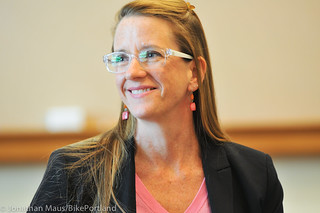Portland will follow in the steps of Chicago and New York City by setting a schedule to completely eliminate traffic fatalities and serious injuries no matter the cost, the city’s transportation director said in a new interview.
In a two-year action plan a city contractor is about to begin preparing, “Vision Zero will be incorporated for certain,” Portland Bureau of Transportation director Leah Treat said in an interview with the KBOO Bike Show broadcast Feb. 5.
“Vision Zero,” as the philosophy is known, was first introduced in Sweden in 1997 and has spread to several U.S. cities in recent years. In 2012 it was embraced by the man Treat describes as her mentor, former Chicago Transportation Commissioner Gabe Klein, and it’s the centerpiece of New York City Mayor Bill de Blasio’s transportation policy.
Vision Zero “moves forward from the premise that every traffic crash is preventable and that every injury and life lost on a city’s streets is a fundamental civic failure,” New York City advocacy group Transportation Alternatives wrote in an essay last year trumpeting de Blasio’s campaign endorsement of the concept.
Portland traffic killed 35 people last year while they were in motor vehicles or on foot, including 10 people who were walking across the street.
Though we haven’t yet seen what the city’s commitment will look like, this is the most substantive pledge we’ve heard yet from Treat about improving safety on local streets.
It’s worth noting that the idea of Vision Zero is different from simply making efforts to reduce traffic fatalities, a policy that every city pursues and every politician endorses. Its core principle is that no price, financial or otherwise, is unreasonable if the project would decrease the probability of serious traffic injury.
For example, various branches of the federal government calculate that $20 million, for example, would be too much to spend to prevent a human life from being lost, while $1 million would be worth spending. “Vision Zero” is, among other things, a rejection of that comparison.
The Chicago and New York Vision Zero plans, both of which aim to eliminate fatalities within 10 years, were celebrated by safety advocates there. Last month a trio of San Francisco city supervisors called for a similar plan, though the city hasn’t yet acted on their proposal.
Here’s what Treat said on the subject last week, in response to a question from her interviewer, former Oregon Walks Director (and longtime Vision Zero fan) Steph Routh:
Vision Zero is something that I articulated to my staff within my first week of being here. one person being killed on our roads is too many. There’s no acceptable number of traffic fatalities. I think you have to say Vision Zero. And it’s definitely our philosophy as we’re approaching all of our transportation projects, is you start with the pedestrian and build from there. And in that manner you capture the safety aspects for all users of the roadway. We are working on selecting a consultant — it should be announced in the next week or two — to do our two-year action plan, and in that two-year action plan we will be outlining pedestrian safety goals and Vision Zero will be incorporated for certain. It’s identifying the steps of how we’re going to get there and it’s identifying the time frame. I’m committed to Vision Zero.
Treat’s boss, Transportation Commissioner Steve Novick, said in the same interview that he wasn’t aware of the phrase “Vision Zero.” Routh summarized it as “the idea that any one person killed on our roads is one too many.”
“Oh, that,” Novick said. “That sounds like a pretty good vision.”
We’ll be watching with interest to see how this proposal develops. You can listen to the full show on KBOO’s website and PortlandTransport.com.


